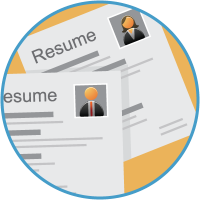 Along with your cover letter, your resume is going to serve as your first impression, so there is simply no room for error. By following these tips, you will be sure to make a great first impression.
Along with your cover letter, your resume is going to serve as your first impression, so there is simply no room for error. By following these tips, you will be sure to make a great first impression.
Salary Requirements – Unless you are responding to a job ad that specifically asks for your salary history and requirements, save the salary talk for the negotiation once you are offered the job. Your first impression and your resume should be all about what you can offer a prospective employer, not what you require from them.
Personal Social Media Links – Save your limited resume real estate for professional accomplishments and experience, not your social media activities. In fact, be sure there aren’t things on your social media pages that could dissuade potential employers from hiring you.
Creative Fonts and images – Even though there is a desire to stand out from the job hunting crowd, using a magenta colored font or embedding photos of you won’t bring you the kind of attention you’re looking for. Hiring managers want to be able to easily get to the heart of your resume to determine whether you have what it takes to handle the job. Help them out by making your resume as professional and easy to follow as possible.
A standard objective statement – A generic objective statement is typically a waste of space on your resume. If you choose to use an objective statement make it specific to the job you are applying to highlighting key words relevant to the company’s culture and mission statement.
Outdated skills – Shining a light on your mastery of outdated office technology such as typing experience or fax machine operation will not only fail to impress potential employers, it will make you seem outdated. Also don’t bother talking about your skills with obvious tools like Microsoft Word, telephones or email. In today’s job market, your ability to navigate basic office technology is a given, not a bonus.
Resumes clichés – Are you a “team player”, your office’s “go to person”, or a “passionate self-starter”? While these may all be true, these tired and worn phrases come off as weak and meaningless on resumes. They are simply overused, generic clichés that have long since lost their ability to impress hiring personnel and make you stand out from the crowd.
Save your bullet points for targeted, measurable, results-driven facts that drive home your perceived value as a prospective employee.
Typos – Although this one seems obvious, you would be surprised by how many people send out resumes with glaring typos. A nationwide survey released by CareerBuilder found that 58% of resumes received by those polled had typos. Sloppiness is not a good way to introduce yourself to prospective employers!
After creating your resume, check it once, twice and a third time. Better still, ask someone you trust to review it as well. Only when you’re absolutely positively sure that your resume is free from typos and mistakes should you think about sending it out.
For more information on creating a resume check out the resources on our JobSpot Website: Resume Resources